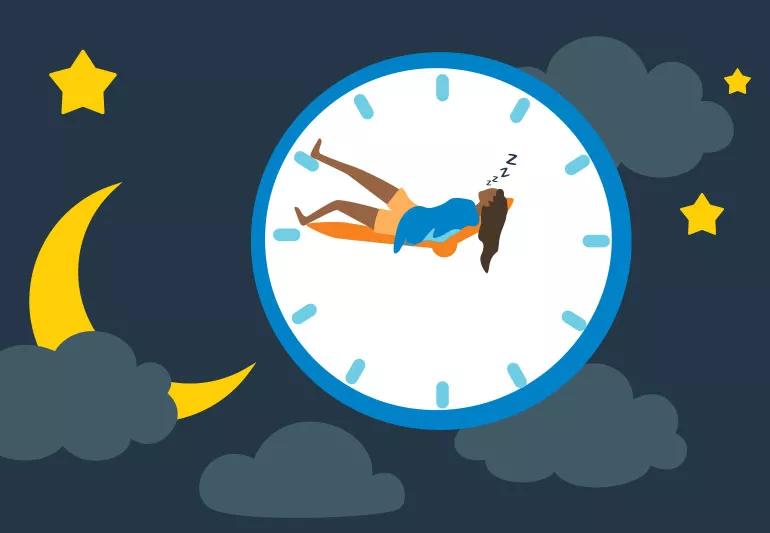Research suggests that we should be snoozing by 10 p.m.

Image content: This image is available to view online.
View image online (https://assets.clevelandclinic.org/transform/26b856c4-7dd9-421c-bfef-b9a87eb62510/bestSleepTime1-1224125130_770x533_jpg)
woman on clock Best sleep time
As the sun sets each day and it gets dark outside, you should ideally be winding down to go to sleep. But bingeing that TV show or scrolling through social media keeps you up past midnight instead of hitting the hay at a decent hour.
Advertisement
Cleveland Clinic is a non-profit academic medical center. Advertising on our site helps support our mission. We do not endorse non-Cleveland Clinic products or services. Policy
A recent study suggests that going to sleep at 10 p.m. is the optimal time. But is there any truth to that?
We ask sleep disorders expert Colleen Lance, MD, who discusses if timing matters and offers tips for getting better sleep.
The study, which was conducted in the United Kingdom, used data from 88,000 adults to determine that 10 p.m. is the ideal hour to go to bed.
Not so fast, says Dr. Lance.
“There’s not a magic number that someone has to adhere to,” she says. “It has to do with what your personal need is and everyone has a different need.”
So, while 10 p.m. may be ideal for some, it won’t work well for others. Instead of focusing on the digits on your alarm clock, Dr. Lance says consistency should be your goal.
That means going to sleep at the same time every night (even if it’s 10 p.m.) and waking up at the same time every morning. Even eating dinner at the same time every day can help you fall asleep. All that consistency helps us function better.
Why? It has to do with our circadian rhythm, an internal clock that’s inside of your body that regulates sleep.
“As the sun goes down, your brain perceives through the lack of light that it’s time to go to sleep,” explains Dr. Lance. “And it triggers a secretion of melatonin. It’s that tiny little burst of melatonin that triggers other neurochemicals to start the process to get you ready to go to sleep in a few hours.”
Advertisement
We also have these internal clocks for our hormones, immune system and digestion.
“If another schedule is off track, you get your body’s clocks all misaligned,” says Dr. Lance. “For instance, if you wait till 10 p.m. to eat dinner, then who knows when you’re going to go to sleep because your circadian rhythm is off.”
And having an inconsistent sleep cycle can lead to an increased risk for obesity and diabetes.
It’s recommended that adults get between 7 and 9 hours of sleep per night. But Dr. Lance suggests finding the total amount of sleep that works for you. So, 7-1/2 hours might work for you while your partner may need 9 hours.
“If you’re somewhere within that range, and you feel good during the day, that’s the most important factor,” she says.
In an ideal night, one would cycle through the various stages of sleep five to six times. Each cycle contains four individual stages: three that form non-rapid eye movement (NREM) sleep and one rapid eye movement (REM) sleep.
“REM sleep is when your brain catches up on its rest,” says Dr. Lance. “If you don’t get enough REM sleep, you may start having problems with memory, mood and concentration.”
If you’re having trouble going to sleep at the same time every night, Dr. Lance offers up the following advice.
Advertisement
In the end, trying to have a little consistency in your bedtime routine can help you get some quality sleep. So switch off your phone, stop the late-night snacks and focus on having a schedule when it comes to sleep. It’s critical to maintaining your health.
Think of it this way, advises Dr. Lance: Your kids have a set bedtime and routine. As adults, we tend to forget the benefits of a reliable regimen, but we put those routines in place for a reason.
“We all know what happens when you let your kids run wild and stay up however late they want,” says Dr. Lance. “It’s hell the next day.”
Advertisement

Sign up for our Health Essentials emails for expert guidance on nutrition, fitness, sleep, skin care and more.
Learn more about our editorial process.
Advertisement
Sleep masks can help you create total darkness so you can sleep better
To avoid sleep deprivation and shift work sleep disorder, try adopting habits that minimize light exposure and prioritize daytime sleep
Sleep disorders, mental health conditions and other health concerns can all affect the quality of your sleep
Most people fall asleep within 10 to 20 minutes, but if your experience is different, adjusting your sleep schedule may help
Stick to a consistent schedule, be mindful of screen time and work on reducing your stress levels before bed
Napping can boost focus, memory and mood — if you time it right
These devices can help shed light on what’s happening with your body during rest
Keep a dream journal, set your intentions before bed and make sure you’re getting a full night of high-quality sleep
Although it could be used as a moisturizer, this new trend is not recommended
Communicating clear limits helps protect your time, energy and emotional well-being
High cholesterol can be genetic, but testing and treatment can lower your heart disease risk